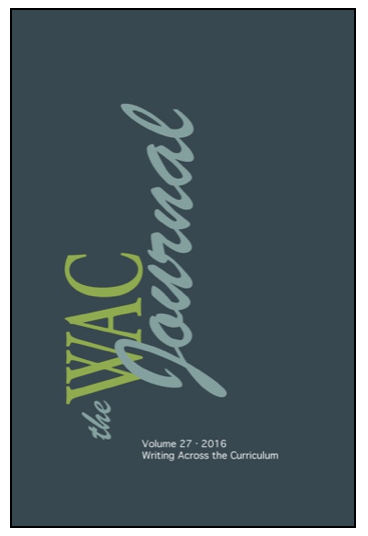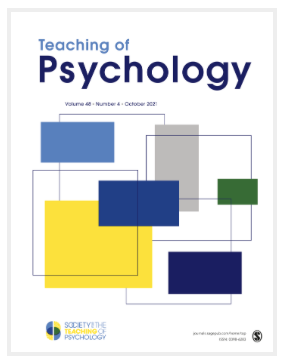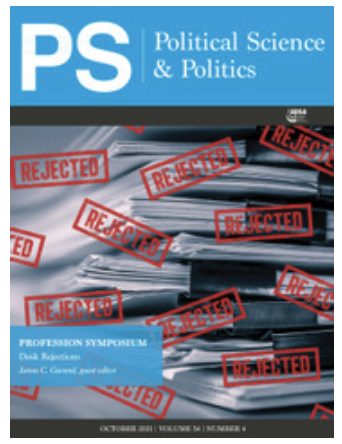The following publications are the product of research conducted at CSU by faculty involved in the gtPathways Writing Integration Initiative. Faculty come from the fields of English, Psychology, Political Science, and Mathematics. You can access the articles via the links (may require logging in with your CSU login information).
 Stories and Explanations in the Introductory Calculus Classroom: A Study of WTL as a Teaching and Learning Intervention
Stories and Explanations in the Introductory Calculus Classroom: A Study of WTL as a Teaching and Learning Intervention
Sue Doe, Mary E. Pilgrim, and Jessica Gehrtz
The WAC Journal 27 (Fall 2016)
https://wac.colostate.edu/journal/vol27/doe.pdf
This study argues writing can play an important role in the teaching and learning of mathematics, particularly through the use of narrative and expository approaches for building conceptual understanding. Authors discuss, as well, the role GTAs play in this work, offering observations and outcomes based on their localized study.
 Active Processing via Write-to-Learn Assignments: Learning and Retention Benefits in Introductory Psychology
Active Processing via Write-to-Learn Assignments: Learning and Retention Benefits in Introductory Psychology
Karla J. Gingerich, Julie M. Bugg, Sue R. Doe, Christopher A. Rowland, Tracy L. Richards, Sara Anne Tompkins and Mark A. McDaniel
Teaching of Psychology 41.4 (Sept 2014), pp. 303-08
https://doi-org.ezproxy2.library.colostate.edu/10.1177/0098628314549701
This study evaluated brief, in-class write-to-learn assignments as a tool for promoting learning and retention in large, introductory psychology courses. A within-subjects (student) design was used with assignment of concepts to write-to-learn and copy (control) conditions counterbalanced across sections for each instructor. Students performed better on exam questions that pertained to concepts they actively wrote about than those that pertained to conceptual information they copied from an instructor’s slide. On a retention test taken approximately 8.5 weeks after the course, students continued to perform better on write-to-learn concepts than on copied concepts. The findings suggest that write-to-learn assignments facilitate active processing of lecture material, which produces modest benefits for learning and retention of key, conceptual knowledge.
 An Evaluation of Grading and Instructional Feedback Skills of Graduate Teaching Assistants in Introductory Psychology
An Evaluation of Grading and Instructional Feedback Skills of Graduate Teaching Assistants in Introductory Psychology
Sue R. Doe, Karla J. Gingerich, Tracy L. Richards
Teaching of Psychology 40.4 (Sept 2013), pp. 274-280
https://doi-org.ezproxy2.library.colostate.edu/10.1177/0098628313501039
This study explored graduate teaching assistant (GTA) grading on 480 papers across two writing assignments as integrated into large Introductory Psychology courses. We measured GTA accuracy, consistency, and commenting (feedback) quality. Results indicate that GTA graders improved, although unevenly, in accuracy and consistency from Time 1 to 2 when compared to professional graders who scored the same papers. GTA commenting on papers improved from Time 1 to Time 2 as well, as indicated by seven measures of feedback effectiveness. However, subsequent to training GTAs gave higher grades than professional graders, and significant interactions between GTAs and time were evident in terms of both grading and commenting improvement. Conclusions for GTA training and professional development are discussed.
 Learning through Writing: Teaching Critical Thinking Skills in Writing Assignments
Learning through Writing: Teaching Critical Thinking Skills in Writing Assignments
Gamze Çavdar and Sue Doe
PS: Political Science & Politics 45.2 (April 2012), pp. 298-306
https://doi.org/10.1017/S1049096511002137
Traditional writing assignments often fall short in addressing problems with college students’ writing as these assignments fail to help students develop critical thinking skills and comprehension of course content. This article reports the use of a two-part (staged) writing assignment with postscript as a strategy for improving student critical thinking in a lower-division political science course. We argue that through well-designed writing assignments, instructors can encourage students to reconsider concepts, critically evaluate assumptions, and undertake substantive revisions of their writing.
From the Researchers…
“Some of the most enjoyable scholarship I’ve been part of was related to gtPathways writing integration. Collaborative research and writing are truly rewarding and so are the scholarship on teaching and interdisciplinary work. I think that we need more opportunities for scholarship such as this, which involves collegial interaction on important issues related to teaching and learning. Plus … there were the friendships we developed as colleagues working together for the good of students.. It doesn’t get much better than that!” –Sue Doe, English
“The article that Sue and I co-authored was motivated to solve some concrete challenges that we faced in the classroom, which was the difficulty of improving students’ writing skills when they were not fully integrating our feedback. I am proud that this research was a joint project between instructors and students because they were involved in our research and contributed to it.” –Gamze Çavdar, Political Science